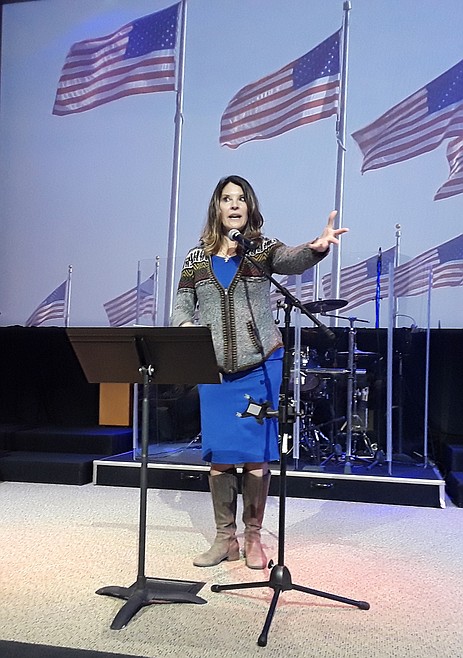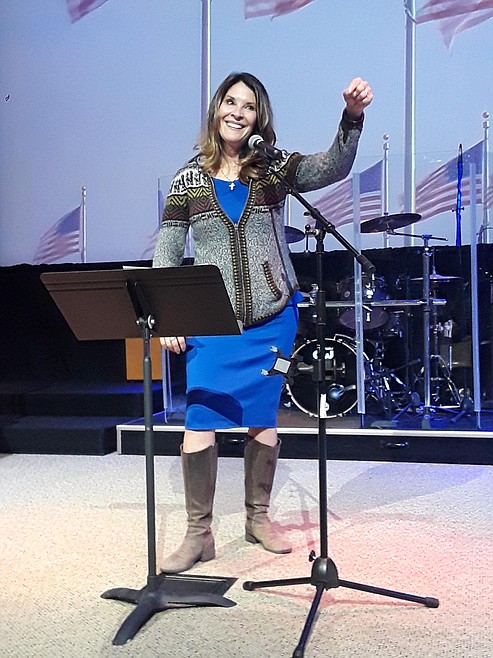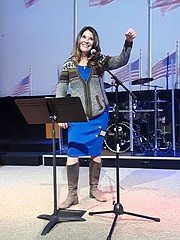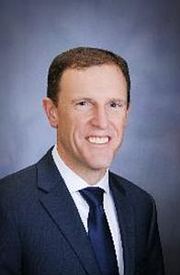McGeachin fires up Cd'A crowd
COEUR d'ALENE - Lt. Gov. Janice McGeachin told a packed church of conservatives in Coeur d’Alene Saturday that Republican senators who flipped their vote on a veto override lacked leadership.
“I don’t think anybody should be persuaded one way or another on a bill,” McGeachin said at a legislative update event Saturday morning at the Candlelight Church. “I feel like people should be able to vote their conscience. But if you have the conviction in your heart to vote a certain way on a policy like this, and you’re going to take your whole caucus out on a limb, you’re taking 81 members of the legislature out on a limb to take a strong stand against the governor, you better commit.”
McGeachin called out five senators in particular — including Sen. Jim Woodward, R-Sagle — who voted to pass Senate Bill 1136 but refused to override its veto when Gov. Brad Little sent it back to the Senate.
SB 1136, one of two pieces of legislation reacting to Little’s handling of the COVID-19 pandemic, would have prohibied a sitting governor from altering or suspending Idaho code in all but extreme situations while capping emergency declarations to 60 days.
It, along with House Bill 135, were two anti-emergency bills to make their way to Little’s desk. Little vetoed both.
“If you’re convicted enough that this is the right thing to do and you’re going to vote for that, then you should not be waiting for whoever the former governor was that called you up over the weekend, or a member of ... big business in Idaho to cause you and persuade you to change your vote,” McGeachin said. “It’s a lack of leadership. What strong leadership would do would be to say, ‘You’re going to do this. This is where we are.’ Both of those bills were changed — if not once or twice — to build a consensus.”
When asked Saturday afternoon to comment, Woodward said his decision didn’t come at the behest of any governor or businessman, but after listening to learned perspectives from experts who are responsible for how Idaho handles its emergencies.
“Between first voting in support of S1136 and voting not to override the veto, part of my decision-making process involved speaking with the Idaho Adjutant General and the director of the Idaho Office of Emergency Management,” Woodward told The Press. “Both expressed concerns with the proposed changes and how it would affect their ability to respond to emergencies.
"These two Idaho National Guard generals are the boots on the ground in Idaho emergencies. I trust their assessment of the bill and, having worn the U.S. military uniform myself, I trust their loyalty to this state and the country.”
McGeachin made her remarks at a gathering sponsored by the Kootenai County Republican Central Committee. While fulfilling a promise to talk about state and legislative issues, she also weighed in on Kootenai County politics, as well, saying that local offices hold considerable impact on communities.
“As conservatives and Republicans, maybe we have lost our way a little bit in some of those local positions,” she said. “We focus so much on electing people to the legislature to make sure they support the right policy. We focus on getting the right people elected to the executive branch of government on the state level, and the same thing on the congressional level, and we focus a lot of our attention on the presidential race.
"But we’ve forgotten the importance of the lower levels and so many opportunities to get involved in what’s happening in our school districts, on our library boards, our public health districts, our county commissioners, city council.”
McGeachin also waded into the ongoing critique of the KCRCC and its partisan endorsements of candidates in nonpartisan races.
“As has been reported in the ‘fake news’ locally, ‘This shouldn’t be your role,’ that ‘partisan politics shouldn’t be entering into these positions,’” she said. “Well, so what? Just because it’s not written that way into the statute doesn’t mean that we, as conservatives, shouldn’t be vetting those people.”
The KCRCC had originally dedicated Saturday’s event as an opportunity for local lawmakers to attend and provide their annual recap of new legislation and issues brought up after the session. But many North Idaho legislators stayed in Boise over the weekend in what’s become an unexpectedly long session: at first because of a COVID-19 outbreak, and then later in an attempt to change education policy through the budget process.
That education policy has been at the forefront of McGeachin’s latest campaign to warn against what many conservatives are calling indoctrination of Idaho children into activist social issues. McGeachin is in the early stages of putting together a task force to examine what she calls on her website “the scourge of critical race theory, socialism, communism, and Marxism.”
It’s a task force she touted Saturday, as well, along with HB 377, legislation aimed at prohibiting indoctrination in Idaho schools.
Conservative lawmakers in the House have held up an appropriation bill that would pay Idaho teachers — and, as a result, are holding up the end of the legislative session — until intent language is added. But many see HB 377 as a way to pass the appropriations bill clean without adding intent language.
“Please contact your senators as we come back to session on Monday,” she told the crowd of more than 500 inside Candlelight. “If that bill passes the legislature, and those budget bills go through, really, there’s no reason for the legislature to remain much longer than this coming Friday. So they can go home, and we can all feel safe and hang onto our wallets and move on with our life.”
The lieutenant governor has been a rising star among the state’s more conservative Republicans after standing in opposition to Little’s navigating of the COVID-19 pandemic that has killed 2,031 Idahoans since March 2020. That navigating included stay-at-home orders, closures and gradual re-openings of what his administration deemed “non-essential” businesses, and advocating of wearing masks to prevent the spread of the disease.
As a result, McGeachin has been speculated as a candidate to challenge Little for his seat in the 2022 gubernatorial election, speculation she coyly addressed Saturday when asked about a possible run. Her answer sparked thunderous applause from the crowd.
“I have come to a decision for what I’m going to do next, along with my husband,” she said. “I don’t feel it’s appropriate to make a public announcement at this time, because I am the president of the Senate. The Senate is still in session. But stay tuned for another week or two, because I’m coming back.”





